3 jan 2015
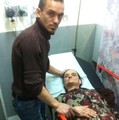
The 65-year old Muna Khalil Abulhawa “Um Khaled” was injured with bruises in her back after she was assaulted by Special Forces personnel in Al-Tur east of the walls of the Old City of Jerusalem.
Abulhawa family explained to Wadi Hilweh Information Center that Special Forces personnel blocked the way of Um Khaled while she was going to the grocery store near her house in Al-Tur and prevented her from walking. The forces then pushed her to the ground and assaulted her with the butts of their guns; note that she has problem with her vision and she is mute.
The family added that Um Khaled lost consciousness and was transferred to Al-Maqased hospital as she was injured with bruises in her back due to the assault; the family explained that there were no clashes to mention in the area at the time Um Khaled was assaulted.
The family filed a claim to Salah Eddin Street police center regarding the assault and is also looking to file another claim against the Special Forces at the “Mahash.”
Abulhawa family explained to Wadi Hilweh Information Center that Special Forces personnel blocked the way of Um Khaled while she was going to the grocery store near her house in Al-Tur and prevented her from walking. The forces then pushed her to the ground and assaulted her with the butts of their guns; note that she has problem with her vision and she is mute.
The family added that Um Khaled lost consciousness and was transferred to Al-Maqased hospital as she was injured with bruises in her back due to the assault; the family explained that there were no clashes to mention in the area at the time Um Khaled was assaulted.
The family filed a claim to Salah Eddin Street police center regarding the assault and is also looking to file another claim against the Special Forces at the “Mahash.”

Violent clashes broke out between Palestinians and Jewish settlers in two towns, southeast of Nablus, on Saturday after the latter kidnapped a group of shepherds.
Local sources told the PIC reporter that the clashes erupted following the kidnaping of three men and two women shepherds by armed Jewish extremists of Itmar settlement, near Aqraba and Oserin towns.
While the people of the town were rushing toward the place to help the kidnapped, the Israeli Occupation Forces (IOF) stormed the area in seven military vehicles providing protection for settlers.
The IOF soldiers used live bullets, tear gas and stun grenades. Two citizens suffered live bullet wounds in their hands while a third was hit with a rubber bullet in his abdomen. Dozens were treated for breathing problems.
The IOF refused to free the kidnapped shepherds and claimed they would be delivered to Israeli-Palestinian District Coordination Office (DCO).
Local sources told the PIC reporter that the clashes erupted following the kidnaping of three men and two women shepherds by armed Jewish extremists of Itmar settlement, near Aqraba and Oserin towns.
While the people of the town were rushing toward the place to help the kidnapped, the Israeli Occupation Forces (IOF) stormed the area in seven military vehicles providing protection for settlers.
The IOF soldiers used live bullets, tear gas and stun grenades. Two citizens suffered live bullet wounds in their hands while a third was hit with a rubber bullet in his abdomen. Dozens were treated for breathing problems.
The IOF refused to free the kidnapped shepherds and claimed they would be delivered to Israeli-Palestinian District Coordination Office (DCO).

The human rights group B'Tselem demanded the Israeli army to stop using dogs to attack Palestinian civilians and protestors, describing it as a horrifying act that is legally and morally reprehensible.
According to B'Tselem, Israeli soldiers used on Tuesday, December 23, 2014, dogs to assault a 16-year-old boy named Hamzeh Abu Hashem during clashes with young men in Beit Ummar town, northwest of al-Khalil.
The soldiers then removed the dogs, handcuffed Abu Hashem, who suffered severe dog bite injuries, and took him to the settlement of Karmei Tzur before he was taken by an ambulance from there to an Israeli hospital and later to Ofer prison.
Two months ago, on 20 October 2014, B’Tselem documented a similar incident in which dogs were unleashed on a young Palestinian man near the Karmei Tzur.
This comes after similar incidents in which dogs were used to attack Palestinian protesters or to arrest Palestinian workmen who entered Israeli occupied territories without permits, the human rights group said.
According to B'Tselem, Israeli soldiers used on Tuesday, December 23, 2014, dogs to assault a 16-year-old boy named Hamzeh Abu Hashem during clashes with young men in Beit Ummar town, northwest of al-Khalil.
The soldiers then removed the dogs, handcuffed Abu Hashem, who suffered severe dog bite injuries, and took him to the settlement of Karmei Tzur before he was taken by an ambulance from there to an Israeli hospital and later to Ofer prison.
Two months ago, on 20 October 2014, B’Tselem documented a similar incident in which dogs were unleashed on a young Palestinian man near the Karmei Tzur.
This comes after similar incidents in which dogs were used to attack Palestinian protesters or to arrest Palestinian workmen who entered Israeli occupied territories without permits, the human rights group said.
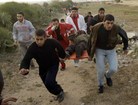
A 25-year-old Palestinian young man suffered bullet injuries when Israeli soldiers on Friday opened fire at citizens to the east of Jabaliya district, north of the Gaza Strip.
A spokesman for the health ministry said the young man suffered two moderate bullet injuries in his legs and was taken to Kamal Adwan hospital in Beit Lahiya.
Other Israeli soldiers in a military post to the east of al-Bureij refugee camp also opened fire at scores of citizens, but luckily no one was injured.
The Israeli occupation army opens fire at Palestinian civilians on the border with Gaza and fishermen almost on a daily basis in violation of the Egyptian-brokered ceasefire agreement that ended last August a massive Israeli war on the besieged Strip.
A spokesman for the health ministry said the young man suffered two moderate bullet injuries in his legs and was taken to Kamal Adwan hospital in Beit Lahiya.
Other Israeli soldiers in a military post to the east of al-Bureij refugee camp also opened fire at scores of citizens, but luckily no one was injured.
The Israeli occupation army opens fire at Palestinian civilians on the border with Gaza and fishermen almost on a daily basis in violation of the Egyptian-brokered ceasefire agreement that ended last August a massive Israeli war on the besieged Strip.

Clashes erupted on Friday night between Israeli occupation forces and young Jerusalemites in Tur suburb in occupied Jerusalem but no casualties were reported.
Eyewitnesses said that the Israeli soldiers fired a barrage of teargas canisters, rubber bullets, and sound bombs at young men and houses.
They said that the soldiers tried to kidnap a 9-year-old child during the confrontations but the inhabitants intervened and foiled the attempt.
The IOF soldiers had earlier on Friday detained two young men in Silwan during similar confrontations.
The Wadi Hilweh information center said that young men threw stones and firecrackers at settlers’ vehicles in Bir Ayub in Silwan prompting the IOF soldiers to cordon off the entire neighborhood and apprehend two youths in their twenties.
Eyewitnesses said that the Israeli soldiers fired a barrage of teargas canisters, rubber bullets, and sound bombs at young men and houses.
They said that the soldiers tried to kidnap a 9-year-old child during the confrontations but the inhabitants intervened and foiled the attempt.
The IOF soldiers had earlier on Friday detained two young men in Silwan during similar confrontations.
The Wadi Hilweh information center said that young men threw stones and firecrackers at settlers’ vehicles in Bir Ayub in Silwan prompting the IOF soldiers to cordon off the entire neighborhood and apprehend two youths in their twenties.
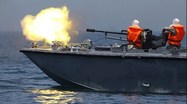
A Palestinian fisherman was shot and injured at dawn Saturday when Israeli warships opened fire off Rafah shores to the south of Gaza.
The injured fisherman was transferred to hospital for treatment after being shot by a live bullet in the pelvis during Israeli shelling off Rafah and Khan Younis coasts.
In a similar attack, a Palestinian youth was shot in his leg by two live bullets Friday evening east of Jabalia. The injured was taken to hospital with moderate injuries.
The two attacks fell as part of Israeli continued violations of the ceasefire agreement between Palestinian resistance and Israeli occupation signed last August under Egyptian mediation.
The injured fisherman was transferred to hospital for treatment after being shot by a live bullet in the pelvis during Israeli shelling off Rafah and Khan Younis coasts.
In a similar attack, a Palestinian youth was shot in his leg by two live bullets Friday evening east of Jabalia. The injured was taken to hospital with moderate injuries.
The two attacks fell as part of Israeli continued violations of the ceasefire agreement between Palestinian resistance and Israeli occupation signed last August under Egyptian mediation.
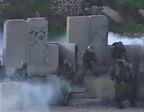
Israeli soldiers invaded, on Friday, the village of Deir Nitham, northwest of the central West Bank city of Ramallah, imposed a curfew forcing the residents under house arrest, and launched a wide-scale search campaign into dozens of homes, kidnapping one resident.
Palestinian TV has reported that the soldiers caused excessive property damage to a number of homes, after violently breaking into them and ransacking the property of the owners.
The news station added that the soldiers smashed several windows of the home of Dr. Khaled Tamimi, and caused property damage to a number of homes, including the home of Mohannad Othman Tamimi and Ahmad Othman Abdul-Hamid Tamimi, 40, in an attempt to pressure his child, Shehab, 14 years of age, to hand himself in to the army.
The soldiers allege the child hurled stones at their vehicles, and is currently “wanted for interrogation.”
A member of the Deir Nitham Land Defense Committee, Safi Tamimi, said at least six Israeli military vehicles invaded the village, and imposed curfew, leading to clashes between the invading soldiers and local youths.
Tamimi said the village has been under strict Israeli military measures, and siege, in addition to escalating attacks carried out by fanatic Israeli settlers against the residents, their homes and lands.
“The attacks are ongoing and escalating; the villagers are constantly suffering,” Tamimi said, “We demand international human rights groups to intervene and end this escalating aggression carried out by both the soldiers and settlers.”
On Friday night, several Israeli military vehicles invaded Ramallah at-Tehta area, in the central West Bank city of Ramallah, and clashed with local youth.
Clashes also took place during the day near the Ofer Israeli prison and military base, west of Ramallah. The soldiers fired dozens of gas bombs at local youth, who managed to throw some of the gas bombs back at the soldiers, causing them to suffer the effects of their own tear gas.
Many Palestinians suffered the effects of tear gas inhalation, while one was shot by a live round, the Palestinian TV said.
Palestinian TV has reported that the soldiers caused excessive property damage to a number of homes, after violently breaking into them and ransacking the property of the owners.
The news station added that the soldiers smashed several windows of the home of Dr. Khaled Tamimi, and caused property damage to a number of homes, including the home of Mohannad Othman Tamimi and Ahmad Othman Abdul-Hamid Tamimi, 40, in an attempt to pressure his child, Shehab, 14 years of age, to hand himself in to the army.
The soldiers allege the child hurled stones at their vehicles, and is currently “wanted for interrogation.”
A member of the Deir Nitham Land Defense Committee, Safi Tamimi, said at least six Israeli military vehicles invaded the village, and imposed curfew, leading to clashes between the invading soldiers and local youths.
Tamimi said the village has been under strict Israeli military measures, and siege, in addition to escalating attacks carried out by fanatic Israeli settlers against the residents, their homes and lands.
“The attacks are ongoing and escalating; the villagers are constantly suffering,” Tamimi said, “We demand international human rights groups to intervene and end this escalating aggression carried out by both the soldiers and settlers.”
On Friday night, several Israeli military vehicles invaded Ramallah at-Tehta area, in the central West Bank city of Ramallah, and clashed with local youth.
Clashes also took place during the day near the Ofer Israeli prison and military base, west of Ramallah. The soldiers fired dozens of gas bombs at local youth, who managed to throw some of the gas bombs back at the soldiers, causing them to suffer the effects of their own tear gas.
Many Palestinians suffered the effects of tear gas inhalation, while one was shot by a live round, the Palestinian TV said.

Protesters plead with soldiers at Nabi Saleh protest 1/2/15
One boy was injured, and scores of civilians were treated for the effects of tear gas inhalation on Friday when Israeli soldiers attacked nonviolent weekly protests organized in West Bank villages.
The protests are held every Friday midday in a number of West Bank villages to protest the illegal confiscation of the villages' land for the construction of the Israeli Annexation Wall.
This week, Israeli troops attacked the weekly protest organized by the villagers of Kufur Qaddoum in the northern West Bank. One of the spokespeople for the non-violent movement in the village, 45-year old Khaldoun Abu Khaled, was abducted by the occupying troops.
Soldiers also invaded the village and fired tear gas into residents’ homes. As a result, many civilians, including children, suffered effects of tear gas inhalation.
In the central West Bank, in the villages of Bil’in and Ni’lin, Israeli soldiers attacked the protesters as soon as they reached the gate in the wall that separates local farmers from their lands. As a result, many protesters suffered the effects of tear gas inhalation and were treated by field medics.
In the nearby village of al Nabi Saleh, Israeli troops fired several rounds of rubber-coated steel bullets at the villagers as soon as they reached the village entrance.
One boy was injured in his leg and was moved to a hospital in the nearby city of Ramallah. Moreover Israeli troops fired tear gas at residential areas causing damage to the houses as some of the tear gas canisters went through the windows inside the villagers’ homes.
In Al-Ma’asara village, Israeli troops stopped villagers and their supporters at the entrance of the village and forced them back, however, no injuries were reported.
The non-violent weekly protests have gone on every week for more than ten years, with the participants committing themselves to non-violent responses to the Israeli military's violence. The military has used these weekly protests as a 'testing ground' for experimental crowd control weapons, including sonic blast weaponry, 'skunk water' that is a mixture of cadaver and feces smells that is sprayed on protesters bodies, where it causes adverse reactions and remains for weeks, toxic ink sprayed onto protesters' bodies for later identification during village house raids, experimental gas bomb combinations and rubber-coated steel bullets that have caused a number of deaths.
One boy was injured, and scores of civilians were treated for the effects of tear gas inhalation on Friday when Israeli soldiers attacked nonviolent weekly protests organized in West Bank villages.
The protests are held every Friday midday in a number of West Bank villages to protest the illegal confiscation of the villages' land for the construction of the Israeli Annexation Wall.
This week, Israeli troops attacked the weekly protest organized by the villagers of Kufur Qaddoum in the northern West Bank. One of the spokespeople for the non-violent movement in the village, 45-year old Khaldoun Abu Khaled, was abducted by the occupying troops.
Soldiers also invaded the village and fired tear gas into residents’ homes. As a result, many civilians, including children, suffered effects of tear gas inhalation.
In the central West Bank, in the villages of Bil’in and Ni’lin, Israeli soldiers attacked the protesters as soon as they reached the gate in the wall that separates local farmers from their lands. As a result, many protesters suffered the effects of tear gas inhalation and were treated by field medics.
In the nearby village of al Nabi Saleh, Israeli troops fired several rounds of rubber-coated steel bullets at the villagers as soon as they reached the village entrance.
One boy was injured in his leg and was moved to a hospital in the nearby city of Ramallah. Moreover Israeli troops fired tear gas at residential areas causing damage to the houses as some of the tear gas canisters went through the windows inside the villagers’ homes.
In Al-Ma’asara village, Israeli troops stopped villagers and their supporters at the entrance of the village and forced them back, however, no injuries were reported.
The non-violent weekly protests have gone on every week for more than ten years, with the participants committing themselves to non-violent responses to the Israeli military's violence. The military has used these weekly protests as a 'testing ground' for experimental crowd control weapons, including sonic blast weaponry, 'skunk water' that is a mixture of cadaver and feces smells that is sprayed on protesters bodies, where it causes adverse reactions and remains for weeks, toxic ink sprayed onto protesters' bodies for later identification during village house raids, experimental gas bomb combinations and rubber-coated steel bullets that have caused a number of deaths.
2 jan 2015

A group of Jewish settlers attacked at dawn Friday Palestinian vehicles traveling on Jenin-Nablus road near the junction of Jaba village south of Jenin.
Around 12 vehicles carrying settlers stormed today the evacuated settlement of Tarsleh and blocked Jenin-Nablus road under military protection.
The settlers spread amongst nearby olive trees and embarked on attacking and stoning the passing Palestinian cars in the presence of Israeli soldiers, eyewitnesses said.
During the attack, the settlers chanted racist slurs against the Palestinians.
Meanwhile, Israeli media sources claimed that three Molotov cocktails were thrown overnight at a home appropriated by settlers in Ras Amoud neighborhood in occupied Jerusalem.
The sources said that Palestinian young men threw three Molotov cocktails at the house, with no reported injuries.
The Israeli police launched a wide manhunt following the incident.
Around 12 vehicles carrying settlers stormed today the evacuated settlement of Tarsleh and blocked Jenin-Nablus road under military protection.
The settlers spread amongst nearby olive trees and embarked on attacking and stoning the passing Palestinian cars in the presence of Israeli soldiers, eyewitnesses said.
During the attack, the settlers chanted racist slurs against the Palestinians.
Meanwhile, Israeli media sources claimed that three Molotov cocktails were thrown overnight at a home appropriated by settlers in Ras Amoud neighborhood in occupied Jerusalem.
The sources said that Palestinian young men threw three Molotov cocktails at the house, with no reported injuries.
The Israeli police launched a wide manhunt following the incident.

The Israeli occupation forces (IOF) on Thursday afternoon opened fire at two Palestinian workmen and seriously wounded one of them as they reached the crossroads of Burin village, south of Nablus city.
Eyewitnesses told the Palestinian Information Center (PIC) that a Palestinian workman suffered multiple bullet injuries during the gunfire attack, adding that the men were en route from their workplace in the 1948 occupied lands to their homes.
The wounded man was rushed to an Israeli hospital in the occupied territories to receive urgent treatment, while the other managed to escape with his life.
Still no information is available about the identities of the workmen or the reason behind the shooting incident.
Meanwhile, the IOF took a Palestinian young man prisoner at Hawwara military checkpoint, south of Nablus.
The PIC was told that Israeli soldiers violently rounded up the young man during his participation in a peaceful protest near the checkpoint.
The young man was taken handcuffed and blindfolded aboard a military vehicle to an interrogation center, according to eyewitnesses.
Eyewitnesses told the Palestinian Information Center (PIC) that a Palestinian workman suffered multiple bullet injuries during the gunfire attack, adding that the men were en route from their workplace in the 1948 occupied lands to their homes.
The wounded man was rushed to an Israeli hospital in the occupied territories to receive urgent treatment, while the other managed to escape with his life.
Still no information is available about the identities of the workmen or the reason behind the shooting incident.
Meanwhile, the IOF took a Palestinian young man prisoner at Hawwara military checkpoint, south of Nablus.
The PIC was told that Israeli soldiers violently rounded up the young man during his participation in a peaceful protest near the checkpoint.
The young man was taken handcuffed and blindfolded aboard a military vehicle to an interrogation center, according to eyewitnesses.
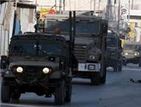
At least eleven Israeli military vehicles invaded, on Friday at dawn, several areas south of the West Bank city of Ramallah, and Betunia town, and kidnapped two Palestinians.
Media sources in Ramallah have reported that the army invaded Ein Monjed and al-Masyoun areas, in addition to Betunia nearby town, and clashes with dozens of local youths. The soldiers fired rounds of live ammunition, gas bombs and rubber-coated metal bullets.
The sources added that the army surrounded an old house in the al-Masyoun neighborhood and detonated its front door before kidnapping Mohammad al-‘Ajlouni, and another Palestinian who remained unidentified until the time of this report.
The soldiers then withdrew to the ‘Ofer military base, built on Palestinian lands belonging to Betunia town.
In related news, soldiers of the Nachshon brigade, operating in Israeli detention centers, broke into a room in Section 1 of the Majeddo prison, allegedly after the detainees wrote graffiti on it walls.
The soldiers also attacked several detainees, and imposed fines on them; three of them have been identified as Ahmad Daraghma, Wael al-Hashash, Hosni al-Burini and Hamza al-Qar’wai.
Media sources in Ramallah have reported that the army invaded Ein Monjed and al-Masyoun areas, in addition to Betunia nearby town, and clashes with dozens of local youths. The soldiers fired rounds of live ammunition, gas bombs and rubber-coated metal bullets.
The sources added that the army surrounded an old house in the al-Masyoun neighborhood and detonated its front door before kidnapping Mohammad al-‘Ajlouni, and another Palestinian who remained unidentified until the time of this report.
The soldiers then withdrew to the ‘Ofer military base, built on Palestinian lands belonging to Betunia town.
In related news, soldiers of the Nachshon brigade, operating in Israeli detention centers, broke into a room in Section 1 of the Majeddo prison, allegedly after the detainees wrote graffiti on it walls.
The soldiers also attacked several detainees, and imposed fines on them; three of them have been identified as Ahmad Daraghma, Wael al-Hashash, Hosni al-Burini and Hamza al-Qar’wai.
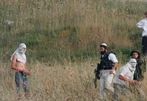
Dozens of fanatic Israeli settlers gathered, on Thursday at night, on the main Jenin-Nablus road, in the northern part of the occupied West Bank, and attacked several Palestinian cars. Settlers approve olive saplings near Bethlehem.
Local sources said the settlers hurled stones at the cars, and surrounded them before trying to assault the Palestinians while shouting and cursing at them.
The sources added that Israeli soldiers were in the area, but did not even attempt to stop or remove the settlers.
Groups of settlers also invaded the location of a former illegal Israeli settlement outpost, near Sanour Palestinian village, south of Jenin, and attacked many Palestinians.
On Thursday evening, a number of extremist Israeli settlers invaded a Palestinian orchard, near the al-Khader town south of Bethlehem, and uprooted at least 80 olive saplings belonging to resident Mohammad Ibrahim Ghneim.
Coordinator of the Popular Committee against the Wall and Settlements in al-Khader Ahmad Salah said the attack targeted Thaghret Hammad area, close to Eliezer and Daniel illegal settlements.
He added that the area in question is subject to frequent attacks by the settlers and the army, and that the soldiers recently decided to illegally confiscate 80 Dunams of Palestinian lands to expand the illegal settlements.
Local sources said the settlers hurled stones at the cars, and surrounded them before trying to assault the Palestinians while shouting and cursing at them.
The sources added that Israeli soldiers were in the area, but did not even attempt to stop or remove the settlers.
Groups of settlers also invaded the location of a former illegal Israeli settlement outpost, near Sanour Palestinian village, south of Jenin, and attacked many Palestinians.
On Thursday evening, a number of extremist Israeli settlers invaded a Palestinian orchard, near the al-Khader town south of Bethlehem, and uprooted at least 80 olive saplings belonging to resident Mohammad Ibrahim Ghneim.
Coordinator of the Popular Committee against the Wall and Settlements in al-Khader Ahmad Salah said the attack targeted Thaghret Hammad area, close to Eliezer and Daniel illegal settlements.
He added that the area in question is subject to frequent attacks by the settlers and the army, and that the soldiers recently decided to illegally confiscate 80 Dunams of Palestinian lands to expand the illegal settlements.
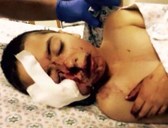
school until after school finished, forcing anyone traveling in either direction to brave whistling tear gas canisters and the dizzying smoke which still lingered even after the shooting had halted.
Early in the morning, Israeli occupation forces grabbed the twelve-year-old near the checkpoint, accusing him of throwing stones. Eyewitnesses present at the scene denied the accusation. After they took the young boy away to the police station, Israeli army and border police advanced further down the road away from the checkpoint, heavily armed with tear gas, stun grenades, and the long rifles used for firing rubber coated steel bullets. Sometimes they fired systematically, setting off five or more rounds of tear gas at a time; at other times it seemed bizarrely random, as when a single border policeman would suddenly run up the street and fire off a tear gas grenade at the distant crowd of children.
In between assaults, when the Israeli military temporarily halted their fire, young boys kicked stun grenades around and tried to squash tear gas grenades with their shoes. Many of them were stuck, waiting behind and among the soldiers as lingering clouds of tear gas fogged the road in front of their school. Looking down the road from near the military’s position to where the tear gas was landing, one could catch glimpses of the impacts: a small child coughing, a teacher dodging the falling tear gas canisters.
Early in the morning, Israeli occupation forces grabbed the twelve-year-old near the checkpoint, accusing him of throwing stones. Eyewitnesses present at the scene denied the accusation. After they took the young boy away to the police station, Israeli army and border police advanced further down the road away from the checkpoint, heavily armed with tear gas, stun grenades, and the long rifles used for firing rubber coated steel bullets. Sometimes they fired systematically, setting off five or more rounds of tear gas at a time; at other times it seemed bizarrely random, as when a single border policeman would suddenly run up the street and fire off a tear gas grenade at the distant crowd of children.
In between assaults, when the Israeli military temporarily halted their fire, young boys kicked stun grenades around and tried to squash tear gas grenades with their shoes. Many of them were stuck, waiting behind and among the soldiers as lingering clouds of tear gas fogged the road in front of their school. Looking down the road from near the military’s position to where the tear gas was landing, one could catch glimpses of the impacts: a small child coughing, a teacher dodging the falling tear gas canisters.

Israeli forces advanced down the main road, standing menacingly across it and also occupying the corners of side-streets, aiming their rifles up towards nearby neighbourhoods. Some stood far down the street, partly hidden by a parked car, in the same location where Israeli border police had arrested a seventeen-year-old boy a couple of weeks earlier. “They look like they’re in a war zone,” one ISM activist commented at the scene, “but what they’re aiming at is five-year-olds.”
As some of the ISM activists walked home, travelling up through the souk (market) in al-Khalil’s Old City, they asked if the tear gas from the area around Qeitun checkpoint had reached all the way up to the shops. “Not too much today,” one shop owner replied. He asked how the activists were. After they gave a brief summery of their morning, he responded matter-of-factly: “there’s always tear gas down there.”
It is a fact of life in al-Khalil – one which perfectly illustrates the senseless, violent injustice so characteristic of the zionist occupation. This morning is only one of countless violent mornings and afternoons these children will face along their everyday route to school. Military assaults and checkpoints are as familiar to them as their daily assignments and schoolbooks. These repeated attacks expose the absurd lengths to which the Israeli occupation has invaded the lives of Palestinians, when even the road to school becomes a battlefield.
As some of the ISM activists walked home, travelling up through the souk (market) in al-Khalil’s Old City, they asked if the tear gas from the area around Qeitun checkpoint had reached all the way up to the shops. “Not too much today,” one shop owner replied. He asked how the activists were. After they gave a brief summery of their morning, he responded matter-of-factly: “there’s always tear gas down there.”
It is a fact of life in al-Khalil – one which perfectly illustrates the senseless, violent injustice so characteristic of the zionist occupation. This morning is only one of countless violent mornings and afternoons these children will face along their everyday route to school. Military assaults and checkpoints are as familiar to them as their daily assignments and schoolbooks. These repeated attacks expose the absurd lengths to which the Israeli occupation has invaded the lives of Palestinians, when even the road to school becomes a battlefield.

Five Palestinian youths were kidnapped Thursday afternoon by undercover Israeli policemen during clashes in al-Issawiya neighborhood, east of occupied Jerusalem.
Eyewitnesses said the clashes broke out when the Israeli police attacked a rally commemorating the 50th foundation anniversary of the Fatah Movement.
Police troops fired a hail of tear gas canisters and rubber bullets at the young men.
During the events, Israeli policemen disguised as Arabs rounded up five young men.
Seven Palestinian young men sustained rubber bullet injuries while dozens, including bystanders, suffered from inhaling tear gas.
Eyewitnesses said the clashes broke out when the Israeli police attacked a rally commemorating the 50th foundation anniversary of the Fatah Movement.
Police troops fired a hail of tear gas canisters and rubber bullets at the young men.
During the events, Israeli policemen disguised as Arabs rounded up five young men.
Seven Palestinian young men sustained rubber bullet injuries while dozens, including bystanders, suffered from inhaling tear gas.
1 jan 2015
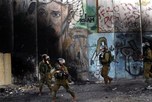
The Israeli occupation forces (IOF) suppressed at noon Thursday a rally organized by popular resistance activists in Nabi Saleh village, west of Ramallah, on the fiftieth inception anniversary of Fatah Movement.
The IOF soldiers used tear gas and stun grenades to disperse the participants, who were heading to al-Ain area threatened with Judaization. A number of participants suffered from suffocation and were treated on the field.
For their part, the participants threw stones at the army forces and clashes continued for several hours.
Attalla al-Tamimi, a popular resistance activist and Fatah supporter, told Anadolu news agency that “the Palestinian people are organizing a march in the territories threatened with Judaization to display refusal of settlement expansion and to commemorate the fiftieth anniversary of Fatah”.
“Fatah Movement and popular resistance committees affirm, on this occasion, the adherence to the popular resistance option”, he said.
Fatah is celebrating its fiftieth anniversary as it was first launched on the first of January, 1965.
Popular Committees against the Wall and Settlement are a non-governmental grouping of Palestinian activists, working on arranging anti-settlement and anti-wall campaigns and rallies. Foreign activists take part in those rallies out of solidarity with the Palestinian people.
The IOF soldiers used tear gas and stun grenades to disperse the participants, who were heading to al-Ain area threatened with Judaization. A number of participants suffered from suffocation and were treated on the field.
For their part, the participants threw stones at the army forces and clashes continued for several hours.
Attalla al-Tamimi, a popular resistance activist and Fatah supporter, told Anadolu news agency that “the Palestinian people are organizing a march in the territories threatened with Judaization to display refusal of settlement expansion and to commemorate the fiftieth anniversary of Fatah”.
“Fatah Movement and popular resistance committees affirm, on this occasion, the adherence to the popular resistance option”, he said.
Fatah is celebrating its fiftieth anniversary as it was first launched on the first of January, 1965.
Popular Committees against the Wall and Settlement are a non-governmental grouping of Palestinian activists, working on arranging anti-settlement and anti-wall campaigns and rallies. Foreign activists take part in those rallies out of solidarity with the Palestinian people.
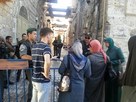
The Israeli occupation police on Wednesday evening detained a Turkish young man after physically assaulting him at the Aqsa Mosque.
Spokesman for the Islamic Waqf Authority Firas al-Debs said that Israeli policemen engaged in an altercation with a Turkish young man during his presence at the Dome of the Rock in the Mosque and violently subdued him.
Debs explained that one of the policemen provocatively talked with the young man and asked for his passport, although the latter did not know how to speak Hebrew, Arabic or English.
Afterwards, the young man was taken handcuffed to a police station outside the Mosque for questioning before releasing him.
Spokesman for the Islamic Waqf Authority Firas al-Debs said that Israeli policemen engaged in an altercation with a Turkish young man during his presence at the Dome of the Rock in the Mosque and violently subdued him.
Debs explained that one of the policemen provocatively talked with the young man and asked for his passport, although the latter did not know how to speak Hebrew, Arabic or English.
Afterwards, the young man was taken handcuffed to a police station outside the Mosque for questioning before releasing him.
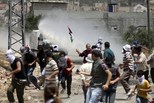
At least four Palestinian youths were injured after being hit with live and rubber bullets fired by Israeli occupation forces (IOF) during clashes that erupted Wednesday evening at the entrance of Enata town in occupied Jerusalem.
Dozens suffered breathing problems after inhaling tear gas fired during the clashes.
Local sources said that the clashes broke out when IOF soldiers raided and closed Enata crossroad claiming that local youths stoned settlers’ vehicles while passing through the area.
Heavy tear gas bombs, rubber and live bullets were fired during the clashes, causing several injuries among the youths.
For their part, angry protesters responded by throwing stones and fireworks towards the soldiers who were forced to withdraw from the area after two hours.
Meanwhile, violent clashes erupted Wednesday between dozens of Palestinian youths and IOF soldiers who broke into Zababda town to the east of Jenin.
Local residents said that IOF troops in 11 military vehicles raided the town and surrounded a building inhabited by students at the Arab American University in the town which led to the outbreak of the clashes.
The Israeli forces raided the building and started firing tear gas bombs, while local youths responded by stoning them.
Breathing problems were reported among the residents during the clashes.
Dozens suffered breathing problems after inhaling tear gas fired during the clashes.
Local sources said that the clashes broke out when IOF soldiers raided and closed Enata crossroad claiming that local youths stoned settlers’ vehicles while passing through the area.
Heavy tear gas bombs, rubber and live bullets were fired during the clashes, causing several injuries among the youths.
For their part, angry protesters responded by throwing stones and fireworks towards the soldiers who were forced to withdraw from the area after two hours.
Meanwhile, violent clashes erupted Wednesday between dozens of Palestinian youths and IOF soldiers who broke into Zababda town to the east of Jenin.
Local residents said that IOF troops in 11 military vehicles raided the town and surrounded a building inhabited by students at the Arab American University in the town which led to the outbreak of the clashes.
The Israeli forces raided the building and started firing tear gas bombs, while local youths responded by stoning them.
Breathing problems were reported among the residents during the clashes.

A horde of Israeli settlers from the so-called David settlement, built east of Bethlehem city, on Wednesday evening violently attacked the Palestinian mayor of Jannatah municipality.
Meanwhile, more than 300 fanatic settlers on Wednesday night flocked to the Gush Etzion settlement bloc, north of al-Khalil city, calling for taking revenge for an alleged settler’s murder.
An Israeli settler had been killed a month ago near Jericho city during an auto burglary.
Meanwhile, more than 300 fanatic settlers on Wednesday night flocked to the Gush Etzion settlement bloc, north of al-Khalil city, calling for taking revenge for an alleged settler’s murder.
An Israeli settler had been killed a month ago near Jericho city during an auto burglary.
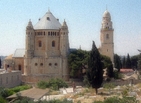
Dormition Abbey, Jerusalem
Israeli forces, on Wednesday, abducted dozens of Palestinians, including minors, from various districts in the occupied West Bank and Jerusalem. Several injuries and other violations by Israeli forces and extremist settlers were reported.
WAFA Palestinian News & Info Agency reports that Israeli police raided ath-Thuri neighborhood, in Silwan, where they arrested Mahmoud Hadia, Mohammad al-Jolani, Mohammad al-Mohtaseb, Adham Abu Nijma, Mohammad Iskafi, Hamzi al-Shwaiki and Mohammad at-Tawil.
East of Jerusalem, Israeli police raided al-Eizariya town, took three Palestinians, including 16-year-old Bara’ Mahmoud and 14-year-old ‘Ali Abu al-Hummus. The third person has not yet been identified.
Police also raided Ras al-‘Amud and at-Tur neighborhoods, kidnapping two minors identified as Naser Fares and Khader Da’oud.
Eight Palestinian children were also abducted near Ofer Prison, on the West Bank-Israel border near Ramallah, according to local sources.
Witnesses said that an Israeli army force ambushed the children near the prison and abducted them. The attacking soldiers also reportedly assaulted the children’s mothers, who attempted to release their children.
Soldiers fired teargas and toxic gas canisters towards the mothers, causing some of them to suffocate.
A report published by UNICEF, in 2013, stated that the “ill treatment of children who come in contact with military detention system appears to be widespread, systematic, and institutionalized throughout the process from the moment of arrest until the child’s prosecution and eventual conviction and sentencing.”
According to October 2014 statistics, a total of 182 children had been imprisoned by Israeli, 19 of them are under the age of 14 to 16.
Hours earlier, on Wednesday, police took into custody Saif and Deya’ ‘Ubaid, two residents from al-‘Isawiya village, while they were near Bab al-‘Amud.
In the West Bank and, in particular, the Tulkarem district, forces raided Shwaika neighborhood, to the north of the city, where they kidnapped 21-year-old Muhammad Badawi, 18-year-old Mujahed Kattawi and 22-year-old ‘Adel Kadduha, after breaking into and ransacking their homes.
Meanwhile, in the Tubas district, forces took 24-year-old Hazem Maslamani and Hamza Daraghma after invading their homes with canine units.
Maslamani, whose father was imprisoned and exiled to the Gaza Strip by Israel, sustained injuries as a result of being brutally assaulted by soldiers.
Israeli authorities also confiscated the contents of a commercial store in the village of Housan, to the west of Bethlehem.
A local activist told WAFA correspondence that an Israeli army force, accompanied by heavy machinery, broke into the village before raiding the store and ravaging its contents, estimated at a value of around $65,000.
The village of Housan has been subject to recurrent army incursions during the past three days, including provocative firing of teargas canisters and stun grenades.
In Jerusalem, on Wednesday, an Israeli settler was arrested for attacking the Dormition Abbey, and vandalizing a cross and a statue, local media reported.
The Executive Secretary of the Jerusalem Inter-Church Center of the Heads of Churches of Jerusalem (JIC), Yusef Daher, told WAFA that the church was attacked by an Israeli settler who vandalized its content, an incident which is not the first of its kind.
In 2013, a similar attack took place where vandals targeted the church, believed to be where the Virgin Mary passed away. Vandals sprayed graffiti on its walls with anti-Christian slogans such as 'Christians are monkeys' and 'Christians are slaves”.
Related: https://www.youtube.com/watch?feature=player_embedded&v=9RY83mAr5uA
According to media reports, the church’s guard arrested the settler after the latter jumped over the wall and vandalized a cross and a statue.
Mr. Daher said such incidents take place often. The only difference is that, this time, Israeli police arrested the settler the same day, he said.
Christian holy sites in Israel and Palestine are frequently vandalized or even burned by extremist Jewish militants, with threats to Christian clergy also a frequent occurence.
The Jerusalem Fund report “When Settlers Attack” stated, “From 2010 to 2011 there was a 39 percent increase in incidents of Israel Settler violence. In the five year period from 2007 through 2011 there has been a 315 percent increase. Conversely, over the same 5-year period, there has been a 95 percent decrease in Palestinian violence in the West Bank.”
Israeli forces, on Wednesday, abducted dozens of Palestinians, including minors, from various districts in the occupied West Bank and Jerusalem. Several injuries and other violations by Israeli forces and extremist settlers were reported.
WAFA Palestinian News & Info Agency reports that Israeli police raided ath-Thuri neighborhood, in Silwan, where they arrested Mahmoud Hadia, Mohammad al-Jolani, Mohammad al-Mohtaseb, Adham Abu Nijma, Mohammad Iskafi, Hamzi al-Shwaiki and Mohammad at-Tawil.
East of Jerusalem, Israeli police raided al-Eizariya town, took three Palestinians, including 16-year-old Bara’ Mahmoud and 14-year-old ‘Ali Abu al-Hummus. The third person has not yet been identified.
Police also raided Ras al-‘Amud and at-Tur neighborhoods, kidnapping two minors identified as Naser Fares and Khader Da’oud.
Eight Palestinian children were also abducted near Ofer Prison, on the West Bank-Israel border near Ramallah, according to local sources.
Witnesses said that an Israeli army force ambushed the children near the prison and abducted them. The attacking soldiers also reportedly assaulted the children’s mothers, who attempted to release their children.
Soldiers fired teargas and toxic gas canisters towards the mothers, causing some of them to suffocate.
A report published by UNICEF, in 2013, stated that the “ill treatment of children who come in contact with military detention system appears to be widespread, systematic, and institutionalized throughout the process from the moment of arrest until the child’s prosecution and eventual conviction and sentencing.”
According to October 2014 statistics, a total of 182 children had been imprisoned by Israeli, 19 of them are under the age of 14 to 16.
Hours earlier, on Wednesday, police took into custody Saif and Deya’ ‘Ubaid, two residents from al-‘Isawiya village, while they were near Bab al-‘Amud.
In the West Bank and, in particular, the Tulkarem district, forces raided Shwaika neighborhood, to the north of the city, where they kidnapped 21-year-old Muhammad Badawi, 18-year-old Mujahed Kattawi and 22-year-old ‘Adel Kadduha, after breaking into and ransacking their homes.
Meanwhile, in the Tubas district, forces took 24-year-old Hazem Maslamani and Hamza Daraghma after invading their homes with canine units.
Maslamani, whose father was imprisoned and exiled to the Gaza Strip by Israel, sustained injuries as a result of being brutally assaulted by soldiers.
Israeli authorities also confiscated the contents of a commercial store in the village of Housan, to the west of Bethlehem.
A local activist told WAFA correspondence that an Israeli army force, accompanied by heavy machinery, broke into the village before raiding the store and ravaging its contents, estimated at a value of around $65,000.
The village of Housan has been subject to recurrent army incursions during the past three days, including provocative firing of teargas canisters and stun grenades.
In Jerusalem, on Wednesday, an Israeli settler was arrested for attacking the Dormition Abbey, and vandalizing a cross and a statue, local media reported.
The Executive Secretary of the Jerusalem Inter-Church Center of the Heads of Churches of Jerusalem (JIC), Yusef Daher, told WAFA that the church was attacked by an Israeli settler who vandalized its content, an incident which is not the first of its kind.
In 2013, a similar attack took place where vandals targeted the church, believed to be where the Virgin Mary passed away. Vandals sprayed graffiti on its walls with anti-Christian slogans such as 'Christians are monkeys' and 'Christians are slaves”.
Related: https://www.youtube.com/watch?feature=player_embedded&v=9RY83mAr5uA
According to media reports, the church’s guard arrested the settler after the latter jumped over the wall and vandalized a cross and a statue.
Mr. Daher said such incidents take place often. The only difference is that, this time, Israeli police arrested the settler the same day, he said.
Christian holy sites in Israel and Palestine are frequently vandalized or even burned by extremist Jewish militants, with threats to Christian clergy also a frequent occurence.
The Jerusalem Fund report “When Settlers Attack” stated, “From 2010 to 2011 there was a 39 percent increase in incidents of Israel Settler violence. In the five year period from 2007 through 2011 there has been a 315 percent increase. Conversely, over the same 5-year period, there has been a 95 percent decrease in Palestinian violence in the West Bank.”
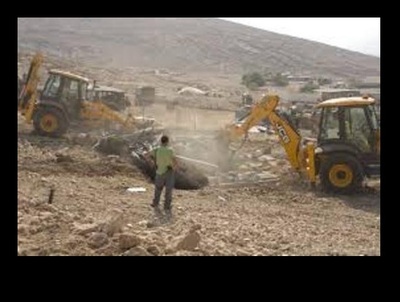
The Israeli occupation army on Wednesday said it arrested three Palestinians from Gaza after they breached the border fence and three fishermen off the coast of Rafah area.
The army radio claimed that an Israeli military patrol spotted three Gazan young men on the Israeli side of the border fence and arrested them, adding that they were taken to the Shin Bet for interrogation.
In another incident, the Israeli navy kidnapped three Palestinian fishermen after chasing their boats off Rafah shore.
The Palestinian coastal police in Rafah told the Palestinian information center (PIC) that Israeli gunboats chased some fishing boats near the coast and opened fire at them before detaining three fishermen identified as Mohamed Basal, Mohamed Nahhal and Iyad Nahhal.
No police information if the Israeli shooting caused injuries to the detained fishermen.
Fishermen and their boats are exposed to almost daily gunfire attacks, harassment or detention by the Israeli navy, although they work within the allowed fishing zone.
The army radio claimed that an Israeli military patrol spotted three Gazan young men on the Israeli side of the border fence and arrested them, adding that they were taken to the Shin Bet for interrogation.
In another incident, the Israeli navy kidnapped three Palestinian fishermen after chasing their boats off Rafah shore.
The Palestinian coastal police in Rafah told the Palestinian information center (PIC) that Israeli gunboats chased some fishing boats near the coast and opened fire at them before detaining three fishermen identified as Mohamed Basal, Mohamed Nahhal and Iyad Nahhal.
No police information if the Israeli shooting caused injuries to the detained fishermen.
Fishermen and their boats are exposed to almost daily gunfire attacks, harassment or detention by the Israeli navy, although they work within the allowed fishing zone.
Page: 2 - 1

